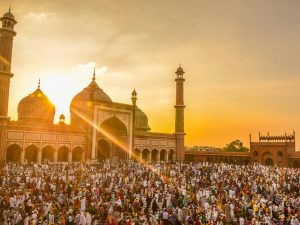
Faculty of Tarbiyah and Teacher Training – Shawwal is not only known as the month of victory after Ramadan but also has many significant historical events worth knowing. These histories are not just to remember the great moments of the Prophet’s struggle in facing tests and obstacles in spreading his message, but also to take lessons and wisdom from these stories. At Alma Ata University, you can delve deeper into the history of Shawwal, exploring the religious values and moral lessons contained in the struggles of the Prophet and the Muslim community during that time.
The history of Shawwal can be divided into three parts: first, about battles, which were a severe test for the Prophet’s mission. The second part is about marriages, as many prophets held wedding ceremonies in Shawwal. That’s why in Indonesia, this month is often called the “wedding month.” The third part includes the history of the births and deaths of great scholars, which also often occurred in this month. Additionally, there are six important events that occurred in Shawwal. However, the focus here is mostly on the first history, which includes the battles that were significant trials in the Prophet’s mission.
Here are six significant events that occurred in the month of Shawwal:
Battle of Uhud
The Battle of Uhud caused a stir in the third year after the Prophet migrated to Madinah, precisely in the month of Shawwal. This has been revealed by historical scholars, such as Imam Ibn Kathir in his “Sirah Nabawiyah li Ibn Kathir” and Sheikh Muhammad Said Ramadan al-Buthi who discusses this in “Fiqih Sirah Nabawiyah.” Exciting, right?
Here’s the story: the Battle of Badr previously made the Quraysh very angry. They were deeply vengeful because their kin were killed in Badr. Their leader, Abu Sufyan, immediately rallied his people for revenge. Additionally, this was a way to restore their honor, which had plummeted after Badr. In this battle, the Muslim army, led directly by the Prophet, consisted of 1,000 people, including 200 fully armored soldiers. The Prophet also dispatched three of his heroes: Mus’ab bin Umair, Usaid bin Hudhair, and Hubab bin Munzir. Their opponents, the Quraysh, had 3,000 men led by Abu Sufyan, including 200 fully armored soldiers and 700 with complete armors. Ultimately, the Quraysh won and managed to push the Muslims back. Thrilling, isn’t it?
Battle of Khandaq
Bro, we have to discuss the super exciting Battle of Khandaq! This cool battle happened in the fifth year after the Prophet migrated to Madinah, right in the month of Shawwal. The story goes: 3,000 Muslim fighters faced a coalition of disbelievers numbering 10,000, but some say they could have been up to 15,000! This coalition included disbelievers from Mecca, Jews, Quraysh, and conspiracy groups.
Initially, the war began due to the provocations of the Jews, which led some groups and tribes to be incited. They were really upset and felt humiliated seeing the Muslims rising and Islam spreading widely. They were also envious of the constant success of the Muslims. So, the Jews had a sinister plan to gather a large force to attack the Muslims. Fortunately, the Muslims discovered this evil plan and informed the Prophet.
During a consultation, our companion Salman Al-Farisi came up with a brilliant idea. He suggested digging a trench in the northern part of Madinah, between Harran Waqim and Harrah al-Wabrah. This place was the only path for the enemy to pass through, while the other sides were protected by natural fortresses, high mountains, small trees, and palm tree forests. Imagine, this would confuse the enemies, making it hard for camels and pedestrians to pass.
Salman’s idea was enthusiastically accepted by the Prophet and other companions. This strategy turned the tables! Thanks to Salman’s brilliant strategy and the unity of the Muslims, they achieved a significant victory. So exciting, right? (Wahbah Az-Zuhaili, Tafsir Al-Munir fil Aqidah was Syari’ah wal Manhaj, [Darul Fikr: 1418], vol. XXI, p. 263).
Battle of Hunain
Dude, we have to talk about the cool Battle of Hunain! This battle broke out in Shawwal, the 8th year of Hijrah in the Hunain valley, which is the route between Mecca and Ta’if. We had a cool army of 12,000 people, 10,000 from Madinah and 2,000 from Mecca. Meanwhile, the enemy had 20,000 personnel. This is thrilling, guys!
This battle happened after we conquered Mecca when Allah gave honor to His Prophet. Suddenly, the Quraysh warriors who used to fight against the Prophet now wanted to be close to him. Meanwhile, the great leaders and chiefs of the Hawazin and Thaqif tribes were busy discussing the Prophet’s victory and the Muslims’ success. They were very envious and angry seeing the Muslims triumph.
Initially, the Muslim army was pushed back by the enemy forces. The enemy’s strategy, led by Malik bin ‘Auf, successfully caused the Muslim army to scatter in the Hunain valley. However, the Prophet called the Muslims back and gave them the good news that Allah would grant them victory. After that, the battle resumed, the Muslims’ spirits soared, and nothing could stop them from achieving victory. Exciting, right? (Sheikh Said Ramadan al-Bhuti, Sirah Nabawiyah, [Beirut: Dar al-Fikr 2006], p. 280).
Battle of Ta’if
Bro, let’s discuss the super exciting Battle of Ta’if! This battle erupted in Shawwal in the 8th year of Hijrah, immediately after the thrilling events of the Battle of Hunain. In this battle, the Muslim army chased the remnants of the Quraysh forces that had fled from Hunain. They hid in the strong fortress of the city of Ta’if, which was so fortified that we couldn’t break through.
When the Prophet saw the situation, he changed the attack strategy. He decided to blockade the entire area of Ta’if. Eventually, the residents of Ta’if surrendered and expressed their desire to join the Muslim community. How exciting is the Prophet’s strategic action? (Sheikh Ahfiyurrahman Al-Mubarakfuri, Ar-Rahiqul Makhtum, [Darul Wafa: n.d.], vol. I, p. 408).
### The Prophet’s Marriages
Bro, in Indonesia, Shawwal is called the wedding month! Many people eventually hold their wedding ceremonies in this month. You know what? That’s actually a cool tradition following the Prophet’s example, who also got married in Shawwal! The marriages of the Prophet with Sayyidah Aisha (RA) and Sayyidah Umm Salamah (RA) are significant historical events that happened in Shawwal. So, when it’s wedding season in Shawwal, it might be because people are following the cool tradition once practiced by the Prophet. Isn’t that exciting? This isn’t just talk, but it’s recorded in several narrations!
عن عائشة قالت: تزوجني رسول الله في شوال. وفي رواية: أن النبي صلى الله عليه وسلم تزوج أم سلمة في شوال
Translation: “From Aisha (RA), she said: ‘The Messenger of Allah married me in Shawwal.’ In another narration: ‘Indeed, the Prophet married Umm Salamah (RA) in Shawwal.’”
Birth and Death of Imam Bukhari
Bro, let’s talk about Imam Bukhari, the legendary figure in the Islamic world! He is a very famous scholar, especially in the field of hadith. It’s amazing that the hadiths he narrated are not just hundreds but thousands, guys! All of these are immortalized in his magnificent work, Sahih Bukhari.
There are two significant events in the history of Imam Bukhari that are noted in Shawwal! First, he was born on Friday, the 13th of Shawwal in 194 Hijri in Bukhara, Uzbekistan. Second, he passed away on the night of 1 Shawwal, which is also the night of Eid al-Fitr. He was buried on the 1st of Shawwal as well.
So, those are six historical events in Shawwal from time to time. Hopefully, they can be a source of inspiration and motivation for us to continue following the Prophet’s struggle. For those still looking for a soulmate, may you find your partner in Shawwal, amen! Wallahu a’lam. (Sheikh Ahmad Bilal, As-Sirajul Munir fi Alqabil Muhadditsin, [Dar Ibn Hazm: n.d.], p. 356). At Alma Ata University, you can conduct a more in-depth study of these historical events and how they have influenced the development of religion and society. Wallahu a’lam.
Source:
- https://www.nu.or.id/nasional/6-peristiwa-penting-di-bulan-safar-7tP5O
- https://www.freepik.com/free-ai-image/digital-art-moon-wallpaper_77362783.htm#fromView=search&term=Ilustrasi+bulan+&track=ais_ai_generated®ularType=ai&page=1&position=4&uuid=78feb809-b1c0-4bac-abb5-be2a27231125







